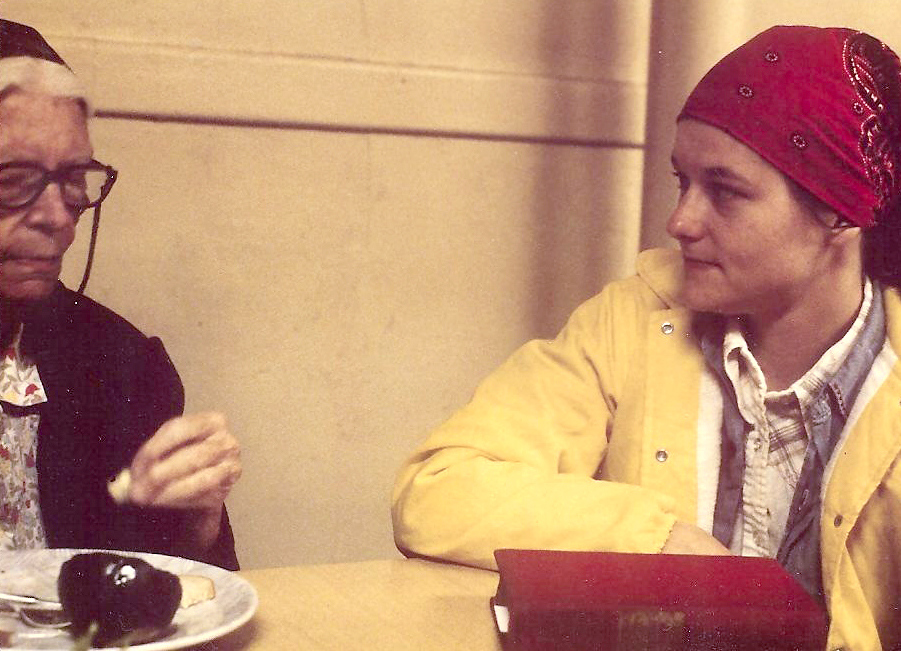Bloomington’s Tina Sipula provides testimony for Dorothy Day’s cause

In this provided photo from 1978, Tina Sipula sits with Catholic Worker founder Dorothy Day, who urged her to keep the "house of hospitality" she was planning in Bloomington small and personable, and to see the face of Christ in every person.
By the time Tina Sipula met Dorothy Day in New York, the founder of the Catholic Worker Movement was 80 and had largely withdrawn from public life. The older woman seemed to recognize a kindred spirit in her young visitor from Bloomington, however, and their week of encounters changed Sipula’s life forever.
On June 14, Sipula returned to New York to provide eyewitness testimony about her experience with and memories of this “Servant of God.” Accounts like hers will be used to help the Archdiocese of New York, which is sponsoring Day’s cause for beatification and canonization, and the Congregation for the Causes of Saints to determine if she lived a life of “heroic virtue.”
“What I learned most from her is to treat people as if they are Christ, especially the broken and the poor. We really tried to emulate that.”
“As with most Catholic Workers, I have mixed feelings about it. She didn’t want to be a saint,” Sipula said. “She said, ‘Don’t call me that. Don’t dismiss me so easily.’”
But she told the members of the Dorothy Day Guild, who are scheduling the witnesses and providing accommodations, that it would be a good thing, “if nothing else to call people to live and work as she did with the poor, to call people to live out the Gospels.”
Then 24, Sipula went to Maryhouse in New York in October of 1978, a few months before she opened Clare House of Hospitality in Bloomington. It was a ministry she would continue — first providing help for women in domestic violence situations and then distributing food and love to those in need — for 37 years.
Clare House closed last November, but the Loaves and Fishes Soup Kitchen that grew out of it continues to feed people twice a week at St. Mary Church in Bloomington. It is now supported by all the Catholic parishes in the Bloomington-Normal area.
“WE ARE ALL CALLED”
Sipula said she didn’t feel qualified to present testimony because her only acquaintance with Day happened over the course of a week. And yet, during that time she was invited into her hero’s room every evening to have dinner with her.
Day talked of her days as a student at the University of Illinois and offered words of wisdom Sipula follows to this day.
“She said, ‘Make sure you keep your house very simple and very personable.’ I took that to heart,” Sipula said. “What I learned most from her is to treat people as if they are Christ, especially the broken and the poor. We really tried to emulate that.”
Day also told her young visitor to “stay close to the sacraments, stay close to the Eucharist,” which she has done.
Dorothy Day’s path didn’t start in the Catholic Church, however.
Born in Brooklyn, New York, on Nov. 8, 1897, she was raised in a “nominally religious” family and eventually baptized in the Episcopal Church in Chicago. She spent two years at the University of Illinois, but moved to New York City in 1916 to work as a journalist.
She would come to admire the Catholic Church as the “church of the poor,” according to information from the Dorothy Day Guild. She had her daughter Tamar baptized in 1926 and entered the Catholic Church the following year.
Sipula said Day prayed for guidance on how to serve the poor while kneeling in the Shrine of the Immaculate Conception in Washington, D.C., and founded the Catholic Worker movement with Peter Maurin when she returned to New York. Today there are more than 120 “houses of hospitality” in the United States and abroad.
Day was 83 when died on Nov. 29, 1980, at Maryhouse. Her cause for sainthood opened in 2000.
Sipula said she thinks Day resisted the suggestion that she might be a saint because she didn’t want people to think the call to serve the poor was reserved to a special few.
“It is a call for all people, all Christians, in fact all religions to help those who are less fortunate than us, to help those who are struggling, who are poor,” Sipula told The Catholic Post. “It’s not just set aside for Catholic Workers. We are all called to do this.”





